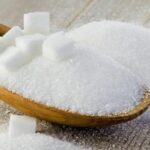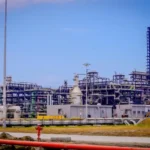Raw sugar to the tune of N410.6 billion was imported to Nigeria in one calendar cycle from the second quarter of 2021 to the first quarter of 2022, reports by the National Bureau of Statistics (NBS) have disclosed.
The commodity, which is the main ingredient for sugar production in the country and among the list of commodities on the foreign exchange restriction list of the Central Bank of Nigeria (CBN), according to the reports, has consistently recorded among the top 10 goods imported, mainly from Brazil.
FG presents 57 oil field licences to investors tomorrow
Experts task FG, devt partners on nutrition financing
A breakdown of each quarter indicates that the commodity, termed “Cane sugar specified in Sub-Heading Note 2 to Chapter 17, meant for sugar refinery” indicated that N114bn was imported from Brazil and Andorra in the second quarter of 2021; while N135bn was used to import it from the same countries in the third quarter of 2021.
However, its importation dropped to N85.3bn and N81.5bn in Q4 2021 and Q1 2022 respectively.
Daily Trust reports that the drop may be connected to the renewed drive to ensure that the four sugar companies that refine the product in the country adhere to a quota system in the importation of the commodity to accelerate local production.
Recall that with Nigeria lacking the capacity to produce large-scale sugar cane plantations to use in producing sugar that would meet up with consumption, the Nigerian Sugar Master Plan (NSMP) was launched in 2013, christened Backward Integration Project (BIP). Its launch was to help stop the importation of refined sugar.
Two decades down the line, its objective has been partially achieved with the birth of Dangote Sugar Refinery, BUA Sugar Refinery and Golden Sugar Refinery.
According to the Executive Secretary/Chief Executive of the National Sugar Development Council (NSDC), Mr Zacch Adedeji, their existence has led to the country refining 3.5m metric tonnes of sugar, a figure that doubles what is consumed in the country.
With Nigeria having a large market for the commodity, the companies spend more to import raw sugar used in refining it, thereby not enabling the utmost success of the BIP which has the intention of limiting the importation of the commodity, as well as creating millions of jobs for Nigerians.
But compliance was not adhered to judiciously, thus Mr Adedeji, at a meeting in February, announced to the sugar companies that subsequent quota for allocation of raw sugar would no longer depend on the size of refining capacity but the extent to which operators had complied with the BIP policy.
He stated that the new system was to reward effort put in complying with the BIP that urged the companies to reinvest profits into the country by establishing sugar estates.
This, he said, would enable the country to be self-sufficient in the production of sugar through the 250,000 hectares needed to produce the 1.7 metric tons of sugar consumed annually.
With the realisation that closing the gap in achieving production is still a long way ahead, President Muhammadu Buhari, last year, launched a N30bn infrastructure intervention to drive development in the sector.
The intervention was for infrastructure development to “accelerate Sugar Backward Integration Programme Projects for irrigation infrastructure on 10,000 hectares of sugar plantations located at six BIP sites: Numan-Adamawa State; Sunti-Niger State; Lafiagi and Bacita-Kwara State; and Toto and Tunga-Nasarawa State.”

 Join Daily Trust WhatsApp Community For Quick Access To News and Happenings Around You.
Join Daily Trust WhatsApp Community For Quick Access To News and Happenings Around You.


